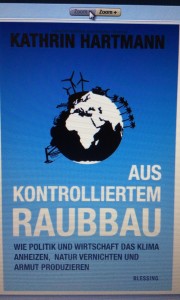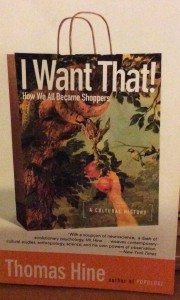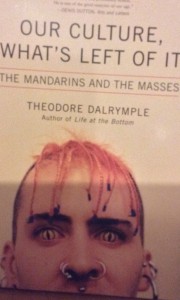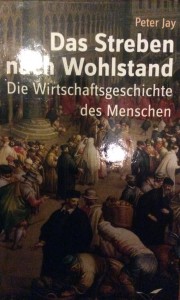RESSOURCEN-SCHONEND LEBEN
- Ausgepowert – Das Ende des Ölzeitalters als Chance, Marcel Hänggi, 2011. Etwas veraltet, aber guter Überblick mit. Klappentext: „(…) zeigt auf, dass wir den Klimawandel nur dann stoppen können, wenn wir unser Verhältnis zur Energie ändern. Denn Energie prägt die Art, wie wir Nahrung produzieren und uns ernähren; wie wir uns bewegen; wie wir konsumieren; wie die Macht in Wirtschaft und Politik verfasst ist.“
- Die Kunst des stilvollen Verarmens – Wie man ohne Geld reich wird, Alexander von Schönburg, 2009, Beschreibung: “ … weiß, wovon er spricht, denn er entstammt einer Familie, die rund 500 Jahre Erfahrung im sozialen Abstieg hat. Er zeigt, dass man für Kleidung, Wohnung, Reisen, Auto keine Unsummen ausgeben muss (…) Ein ebenso intelligentes wie unterhaltsames Manifest gegen den Konsumwahn – und für ein glücklicheres Leben.“
- Possum Living – How to live well without a job and with (almost) no money, Dolly Freed, 2010, Umschlagtext: “ … no nonsense practical advice on how to quit the rat race and live frugally. In her delightful, straightforward, and irreverent style, Freed guides readers on how to buy and maintain a home, dress well, stay healthy, save money and be lazy, proud, miserly, and honest, all while enjoying leisure and keeping up a middle-class facade.“
OBJEKTE UND IHR WERT
- The Value of Things, Neil Cummings und Marysia Lewandowska, 2000, Klappentext: “ The Value of Things demonstrates that the collection and exchange of objects plays a vital role in our definition of culture. It argues that there is a powerful web of links between the departmentstore and the museum, wich will reflect – and change – the status of things we make.“
- Objects of Desire – Design and Society since 1750, Adrian Forty, 2005, Umschlagtext: „In this radical and highly original examination of design and its place in society … he argues that design is used by societies to express their values. Its norms are shaped by economic and social conditions; it can confirm a role or status or be manipulated to overcome resistance …“
- Why Things Bite Back – Technology and the revenge of unintended consequences, Edward Tenner, 1997, Beschreibung: „In this perceptive and provocative look at everything from computer software that requires faster processors and more support staff to antibiotics that breed resistant strains of bacteria, Edward Tenner offers a virtual encyclopedia of what he calls „revenge effects“–the unintended consequences of the mechanical, chemical, biological, and medical forms of ingenuity that have been hallmarks of the progressive, improvement-obsessed modern Age.“
KONSUM & GLOBALISIERUNG
- Consumed – How markets corrupt children, infantilize adults, and swallow citizens whole, Benjamin R. Barber, 2007, Klappentext: Consumed offers a vivid portrait of a global economy that overproduces goods and targets children as consumers in a market where are never enough shoppers – and where the primery goal is no longer to manufacture goods but needs.“
- Globalisierung aus Frauensicht – Bilanzen und Visionen, Ruth Klingebiel, Shallini Randeria (Hg.), 2000. Umschlagtext: „In diesem Band ziehen Wissenschaftlerinnen und politisch engagierte Frauen aus Afrika, Asien und Europa eine kritische Bilanz der Globalisierung. Sie entfalten Zukunftsvisionen einer gerechten Frauenpolitik, die sich auf alle Ebenen zwischenmenschlicher Beziehungen – vom Haushalt bis zum transnationalen Bereich – beziehen.“
- I Want That! – How we all became shoppers, Thomas Hine, 2002, Beschreibung: „Choosing and using objects is a primal human activity, and I Want That! is nothing less than a portrait of humanity as the species that shops. It explores the history of acquisition — finding, choosing, spending — from our amber-coveting Neolithic forebears to Renaissance nobles who outfitted themselves for power to twenty-first-century bargain hunters looking for a good buy on eBay. I Want That! explores the minds of shoppers in the quest to nourish and feed fantasies, to define individuality, to provide for family, and to satisfy the needs for celebration, power, and choice — all of which lead us to malls, boutiques, websites, and superstores.“
- King Cotton – Eine Geschichte des globalen Kapitalismus, Sven Beckert, 2014, Umschlagtext: “ Vor mehr als 250 Jahren wurde das Reich errichtet, in dem King Cotton herrscht. Krieg, Sklaverei und Ausbeutung standen an seiner Wiege. Während fremde Kulturen rücksichtslos zerschlagen wurden, häuften Händler im Zusammenspiel mit der Staatsgewalt enorme Vermögen an. Ein neues ökonomisches Prinzip begann seinen globalen Siegeszug.“
- Our Culture, What’s Left of It: The mandarins and the masses, Theodore Dalrymple, 2007, Beschreibung: „This new collection of essays by the author of Life at the Bottom bears the unmistakable stamp of Theodore Dalrymple’s bracingly clearsighted view of the human condition. It suggests comparison with the work of George Orwell. In these twenty-six pieces, Dr. Dalrymple ranges over literature and ideas, from Shakespeare to Marx, from the breakdown of Islam to the legalization of drugs. Informed by years of medical practice in a wide variety of settings, his acquaintance with the outer limits of human experience allows him to discover the universal in the local and the particular, and makes him impatient with the humbug and obscurantism that have too long marred our social and political life.“
- The European Miracle – Environments, economies and geopolitics in the history of Europe and Asia, Eric Jones, 2003, Beschreibung: „Why did modern states and economies develop first in the peripheral and late-coming culture of Europe? This historical puzzle looms behind every study of industrialization and economic development. In his analytical and comparative work Eric Jones sees the economic condition forming where natural environments and political systems meet: Europe’s economic rise is explained as a favored interaction between them, contrasting with the frustrating pattern of their interplay in the Ottoman empire, India and China.“
GELD
- Das Streben nach Wohlstand – Die Wirtschaftsgeschichte des Menschen, Peter Jay, 2000, Klappentext: „Als Homo oeconomicus haben wir uns auf der Erde ausgebreitet, von Anfang an war jeseits des nackten Überlebens Wohlstandsmehrung unser Bestreben. Doch was veranlasste unsere Ahnen, sesshaft zu werden und Überschüsse zu produzieren? Warum waren einige Zivilisationen erfolgreicher als andere? Gaben Zufall oder Planung, Klima oder Rasse, Wissen oder Macht den Ausschlag? Welche Rolle spielten Weltanschauung und Religion? Welcher Zusammenhang besteht zwischen Bevölkerungswachstum und Wohlstandsstreben?“
- Der Preis des Geldes – Eine Kulturgeschichte, Christina von Braun, 2012, Klappentext: Es bestimmt über unser Leben und sogar über unsere Art zu fühlen. Das Geld ist heute, im Zeitalter virtueller Zahlungsmittel, nur noch ein abstraktes Zeichen. Aber es ist in der Lage, seine eigene Realität zu erschaffen und Einfluss auf unser Denken und unsere Psyche zu nehmen. In ihrer brillianten Analyse der Geschichte des Geldes stellt Christina von Braun die Frage … ,warum wir an ein System glauben, das auf dem Nichts basiert …“
- How Much is Enough? Money and the good life, Robert Skidelski and Edward Skidelsky, 2012, Beschreibung: „A provocative and timely call for a moral approach to economics, drawing on philosophers, political theorists, writers, and economists from Aristotle to Marx to Keynes. What constitutes the good life? What is the true value of money? Why do we work such long hours merely to acquire greater wealth? These are some of the questions that many asked themselves when the financial system crashed in 2008. This book tackles such questions head-on.“
- The Ascent of Money – A financial history of the world, Niall Ferguson, 2009, Beschreibung: „Bread, cash, dosh, dough, loot. Call it what you like, it matters now more than ever. In The Ascent of Money, Niall Ferguson shows that finance is the foundation of all human progress and the lifeblood of history. From the cash injection that funded the Italian Renaissance to the stock market bubble that sparked the French Revolution, from the bonds that fuelled Britain’s war effort to the Wall Street Crash and today’s meltdown, this is the story of boom and bust as it’s never been told before.“
UMWELT
- Aus kontrolliertem Raubbau – Wie Politik und Wirtschaft das Klima anheizen, Natur vernichten und Armut produzieren, Kathrin Hartmann, 2015, Beschreibung: „Doch auch der Rohstoffhunger des grünen Kapitalismus ist riesig: Selbst für nachhaltiges Palmöl, das in Biodiesel und Fertigprodukten steckt, werden Regenwälder gerodet und Menschen vertrieben, wie Kathrin Hartmann in aufrüttelnden Reportagen aus Indonesien zeigt. Ebenfalls schockierend sind ihre Recherchen in Bangladesch: Garnelen aus Zuchtbecken werden mit Öko-Siegeln exportiert, dabei wurden dafür gegen den Willen der Bevölkerung Reisfelder und Mangrovenwälder zerstört. Um den eigenen Hunger zu bekämpfen, zwingt man den Bauern dort Gentechnik-Saatgut auf.“

- Something New Under the Sun – An enviromental history of the twentieth century, John McNeill, 2000. Umschlagtext: „This ground-breaking work Shows us that ist most enduring legacy will in fact be the physical changes we have wrought on the planet. Humanity has undertaken a gigantic Experiment on the earth, refashioning it with an intensity unprecedented in history …“.
- zu Kleidung und Umweltverschmutzung und nachhaltiger Mode siehe auch Literatur-Tipps Die Mode
THEORETISCHE ANSÄTZE
- A Short History of Progress, Ronald Wright, 2005, Beschreibung: „Each time history repeats itself, so it’s said, the price goes up. The twentieth century was a time of runaway growth in human population, consumption, and technology, placing a colossal load on all natural systems, especially earth, air, and water—the very elements of life. Ronald Wright argues that our modern predicament is as old as civilization, a 10,000-year experiment we have unleashed but seldom controlled. Only by understanding the patterns of triumph and disaster that humanity has repeated around the world since the Stone Age can we recognize the experiment’s inherent dangers, and, with luck and wisdom, shape its outcome.“
- Jenseits des Eurozentrismus – Postkoloniale Perspektiven in den Geschichts- und Kulturwissenschaften, Sebastian Conrad, Shalini Randeria (Hg.), 2002. Umschlagstext: “ In Europa bleibt das Reden über die eigenen Gesellschaft nach wie vor einem methodologischen Nationalismus verhaftet. Die vielfachen Verflechtungen und Austauschprozesse zwischen europäischen und außereuropäischen Gesellschaften geraten selten in den Blick. Der Band lädt dazu ein, die europäische Geschichte im Kontext von Kolonialismus und Imperialismus neu zu denken (…).“



